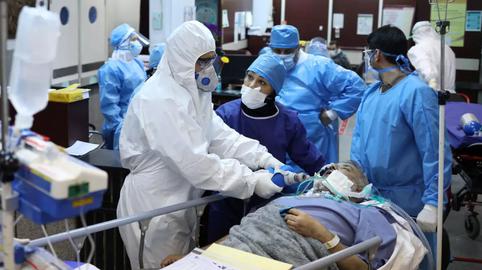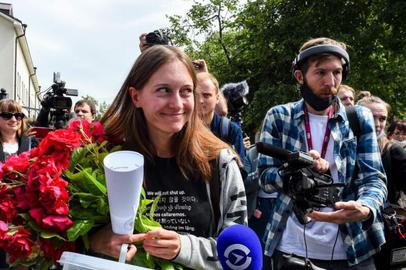Twenty Iranian provinces are in a “red” state of alert as coronavirus cases continue to rise across the country and amid reports on July 7 that 200 more people died from COVID-10.
Among the provinces in a state of emergency are Khuzestan, Hormozgan, Bushehr, Kermanshah, Kurdistan, Ilam, West Azerbaijan, East Azerbaijan and Razavi Khorasan.
Official figures from the health ministry do not reflect the true situation in hard-hit provinces, including Tehran province. At the same time, officials in at least one province have said they will take over the burial proceedings for coronavirus patients and not return the bodies to their families, suggesting an attempt to suppress information about recent cases.
Iranian officials still appear unwilling to accept responsibility for curbing the coronavirus epidemic, and in particular its resurgence in early June. Health Minister Saeed Namaki has repeatedly claimed that he has pleaded with people to observe social distancing but has been ignored. He also said he has been under intense pressure by almost everybody to ensure shops, services and businesses are all reopened.
What Namaki failed to say was that the people applying pressure on him were President Rouhani and government officials, and that people have been ignoring social distancing guidelines because either they have been forced to do so out of necessity or because they no longer trust the repeated misinformation coming from the government about the number of infections and fatalities. In any case, researchers have indicated that such a request must be accompanied by clear rules and enforcement; pleading with people was not a reliable way of ensuring compliance.
Kits and Cures
It had been reported previously that one coronavirus test kit could be used to carry out up to four tests, which means one million kits should deliver four million tests. On July 7, Mehdi Yousefi, the chairman of a body called Currency Saving in Patient Treatment, reported that, according to the health ministry, so far more than one million coronavirus test kits have been distributed across the country. And yet on the same day, the health ministry’s spokeswoman Dr. Sima Sadat Lari reported that a total of 1,846,793 coronavirus tests had been conducted in Iran. If the claim that “more than one million test kits” have been distributed is true, then why is the number of actual tests not even half the number of tests that could have been carried out?
At the same time, one domestic company has come up with a supposed cure. No country has produced a drug that has been fully successful in treating COVID-19, and the world’s major pharmaceutical companies are still hard at work on the challenge, and yet Abbas Zarei, head of University of Tehran Science and Technology Park, claimed that one of the 200 companies based there has manufactured a herbal medicine that can prevent coronavirus infection and is now waiting for a permit to mass produce it.
In addition, Yousef Amrollahi, the CEO of a company based in Fars province’s Science and Technology Park, claimed that his company has manufactured a “nano” test kit that can identify coronavirus infections in less than 30 seconds, adding that it had been unveiled in the presence of Rouhani’s vice president for science and technology. According to him, the company can produce 100,000 kits a day.
So far, however, he says his company has not received a permit to build, market and export the pioneering product.
Can Schools and Exams Carry on as Normal?
It is expected that in the coming school year, classes will be held online, but Semnan governor Alireza Ashnagar has warned that about 5,000 students in the province do not have access to the basic facilities for online learning and 42 schools in Semnan have no access to the internet.
Government officials continue to insist that the nationwide university entrance exams, which close to two million students hope to take, will be held as scheduled. According to Fatemeh Zarin-Amizi, the spokeswoman for the National Testing Organization, there has been no talk about postponing or canceling 2020 exams, whether at the Science Ministry, at the Ministry of Health or by the National Coronavirus Taskforce.
Crisis in the Capital
The number of coronavirus fatalities in Tehran reached 70 for a single day of Monday, July 6, reported Mohsen Hashemi, president of Tehran City Council. Tehran Mayor Mohsen Hanachi said that traffic was having an impact on the city, claiming that scientific data and observations showed that the traffic plan the National Coronavirus Taskforce had put in place was causing people to take unnecessary journeys within the city. Hashemi said that the council would not be commenting on the traffic plan because the taskforce would veto any proposal, and Hanachi said the city had no other option but to follow the regulations issued by the taskforce.
Iranian officials have repeatedly justified their late response to the coronavirus outbreak in Iran by saying that its symptoms are similar to those of influenza. Most recently, on July 7, Dr. Mohammad Jazayeri, head of Center for Viral Diseases, said the similarity in symptoms was the most important factor in explaining why neither China nor Iran were able to handle Covid-19 in an effective and timely manner.
Official Numbers
In the 24 hours spanning July 6 and July, 2,637 new coronavirus patients had been identified, bringing the total of cases in Iran to 245,688, reported Sima Sadat Lari, the spokeswoman for the health ministry. Of the new cases, 1,455 had been hospitalized and during the same 24-hour period 200 Covid-19 patients had died, increasing the total death toll to 11,931.
According to Dr. Sadat Lari, the provinces of Khuzestan, Hormozgan, Bushehr, Kermanshah, Kurdistan, Ilam, West Azerbaijan, East Azerbaijan and Razavi Khorasan are in a “red” or emergency state and the provinces of Tehran, Isfahan, Mazandaran, Golestan, Alborz, Kerman, Yazd, Zanjan, Sistan and Baluchistan, Hamedan and Ardebil are on alert. She added that, as of July 7, 1,846,793 coronavirus tests had been conducted in Iran.
Province Round-up:
The bodies of coronavirus victims will not be handed over to their families, announced Fereydoon Hemmati, governor of Hormozgan, a province in a “red” state of emergency. He added that the government would arrange the burials. He also asked provincial officials to arrange for government employees to work remotely and, if possible, people should also conduct their dealings with the government without going to the offices in person.
Since the coronavirus outbreak in Hormozgan, 934 medical staff, including nurses, doctors and medics, have been infected, reported Hossein Farshidi, president of Hormozgan University of Medical Sciences.
During the first wave of the epidemic, West Azerbaijan was in a better situation than other provinces, but in early July the coronavirus crisis was worsening in the province on a daily basis. According to the official news agency Islamic Republic News Agency (IRNA), every day a “considerable” number of people die from Covid-19 there. And Javad Aghazadeh, president of West Azerbaijan University of Medical Science, reported that two hospitals in the provincial capital of Urmia had run out of beds for coronavirus patients; a third hospital in the city has been reserved for Covid-19 patients. In the small Kurdish city of Bukan in the province, 40 medical personnel working in hospitals have been infected with coronavirus, reported Loghman Hasanpour, Bukan’s governor.
Seventy percent of coronavirus cases in the province of Sistan and Baluchistan have been identified in the provincial capital Zahedan, said Mohammad Hashemi Shahri, president of Zahedan University of Medical Sciences. He also reported that 8,158 coronavirus tests have returned positive, 311 Covid-19 patients were currently hospitalized and 311 have died from coronavirus.
Currently 17 cities in Razavi Khorasan province, including the capital city of Mashhad, are in a “red” state or state of emergency, while three cities are on an “orange” or critical state of alert, reported Hasan Jafari, a deputy provincial governor.
After four months of dealing with the epidemic, the medical personnel of Markazi province are exhausted and cannot effectively provide services to their patients, said Ali Aghazadeh, governor of Markazi province. He warned that if the surge of the epidemic in the province worsens, there will be no other choice but to re-impose some restrictions.
The number of coronavirus fatalities in Qazvin province also increased, and if the trend continues some restrictions would be re-imposed, warned Manouchehr Habibi, director of the Qazvin Coronavirus Taskforce.
Kashan, a city in Isfahan province that was hard-hit by the first wave of coronavirus and had a high rate of fatalities, is now in the grip of a new wave of Covid-19. In a statement, the city’s Coronavirus Taskforce announced that it had re-imposed some restrictions on gatherings and on businesses for a period of one week.
This is part of IranWire's coronavirus chronology. Read the full chronology
visit the accountability section
In this section of Iran Wire, you can contact the officials and launch your campaign for various problems



























comments